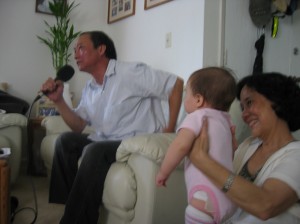 daughter Amelie to meet some relatives who were in town for my cousin’s graduation. My side of the family is Vietnamese, and except for some early cooing from my parents when she was two months old, this was the first time Amelie was surrounded by her Vietnamese relatives, all who baby talked and interacted with her in their native language.
daughter Amelie to meet some relatives who were in town for my cousin’s graduation. My side of the family is Vietnamese, and except for some early cooing from my parents when she was two months old, this was the first time Amelie was surrounded by her Vietnamese relatives, all who baby talked and interacted with her in their native language.the native tongue
 daughter Amelie to meet some relatives who were in town for my cousin’s graduation. My side of the family is Vietnamese, and except for some early cooing from my parents when she was two months old, this was the first time Amelie was surrounded by her Vietnamese relatives, all who baby talked and interacted with her in their native language.
daughter Amelie to meet some relatives who were in town for my cousin’s graduation. My side of the family is Vietnamese, and except for some early cooing from my parents when she was two months old, this was the first time Amelie was surrounded by her Vietnamese relatives, all who baby talked and interacted with her in their native language.